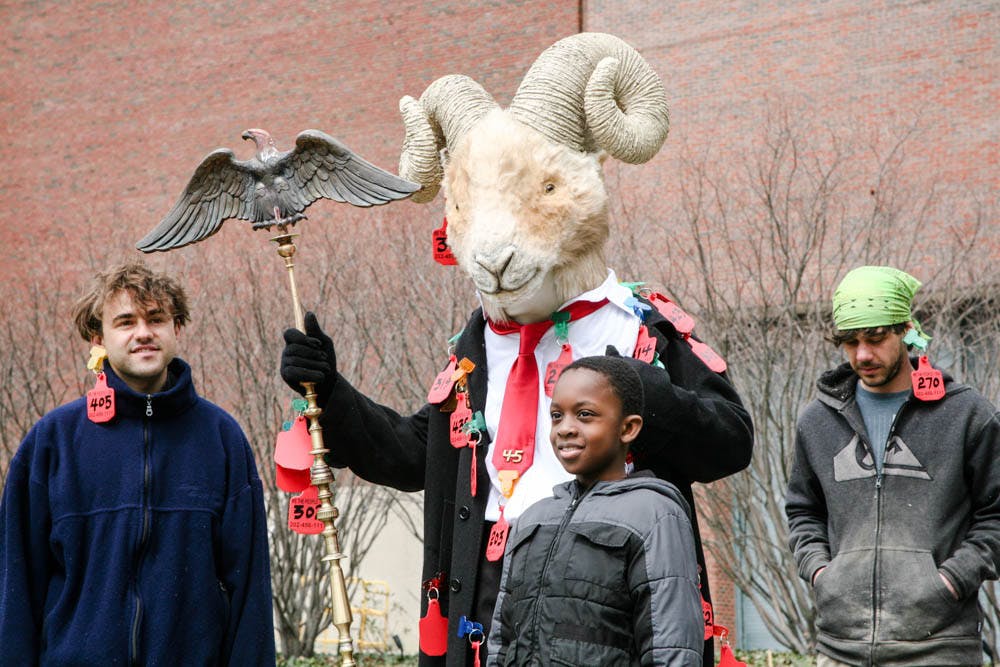Surrounded by confused students, Nigerian artist Jelili Atiku processed across the Main Green yesterday afternoon dressed as a ram with several red-tagged students crawling behind him. Attention piqued, students continued to watch with curiosity.
Atiku was awarded the Artist Protection Fund Fellowship in 2018, granted by the Institute of International Education. At the University, Atiku serves as visiting assistant professor of Africana Studies and works with the Brown Arts Initiative. Atiku “strives to help viewers understand the world and expand their experiences so they can activate and renew their lives and environments,” said Butch Rovan, director of the BAI, in the introduction to Atiku’s talk yesterday following the performance.
As part of his latest performance, Atiku assembled four students to resemble a herd of sheep crawling behind him. Dressed in a suit, carrying a scepter and wearing a ram mask, he led the herd to the American flag located on the Main Green. The students stood up and recited the U.S. national anthem in a monotone voice and then had their red tags removed by the masked artist. Atiku continued to walk across campus, making his way through the Ruth J. Simmons Quadrangle, walking along Thayer Street and finishing his performance in the Granoff Center for the Creative Arts.
“The performance is actually talking about the attitude of the president, Trump,” Atiku told The Herald, commenting on the psychological control he feels the president wields over the American people. At one point in the performance, Atiku sat on a bench next to an unexpecting student, who rose and left after a few moments of bewilderment. Atiku spread his legs, employing dominant body language to illustrate the scale of Trump’s power and control, he explained in the talk.
Since 2015, the APF Fellowship has awarded residencies to threatened artists, said Alison Russo, executive director of the APF. “Artists come to us and we create, design and develop innovative residency programs like the one here at Brown.” The residency is intended to offer artists a way to “develop their practice, build foundations, relationships and hopefully advance, not only their careers, but their personal lives,” Russo added.
“When I was arrested in my country, after I did my performance, I felt the need to be safe,” Atiku told The Herald. “I was talking about domestic terrorism in my community. The king got offended by that. … I got arrested, as well as other five people along with me.”
“For Jelili, the quality of his work is evident as a performance artist,” Russo said. “So the selection committee unanimously awarded him.”
In his talk, Atiku discussed the performance and his artistic and political background in conversation with Dotun Ayobade, a postdoctoral research associate and Mellon Gateway Fellow in the Department of Africana Studies.
Atiku explained the purpose behind some of the elements of the performance. “I think what is interesting is that no part of your body showed,” Ayobade said, referencing the ram mask Atiku donned and the red-tag covered suit. “It’s hard for people to know that this is an African, or this is a black body making this critique.”
“The first thing I try to do is to deconstruct my body in my performance, … and that makes me a symbol of humanity who doesn’t have any color,” Atiku said. “He’s neither black nor green, just human. And that’s what I want to do.”
Atiku also discussed some of his previous pieces. One project performed in Nigeria, in collaboration with a local theater group, involved being tied with ropes and dragged across the ground as if he were a ram. Ayobade described this as an example of one of Atiku’s focuses in his work: using his body and the trauma inflicted upon it “almost like carrying sacrifice on behalf of the collective” in order to get his message across. The tension of the ropes injured his throat, and the participants who pulled the ropes ended the performance in tears.
Though less visceral than some of his past work, yesterday’s performance also relied on the power of bodies. The piece was originally meant to involve 50 students — to represent the 50 states — who would follow Atiku in his procession around campus. The plan had to be changed when only three of the 15 students who signed up arrived to participate — and one joined as the performance was beginning. “There is this space for fluidity,” Atiku said. “I use the situation, I use the audience, I use the circumstances around me” to create the final performance, he added.
As for his time at Brown, Atiku described his experience as “wonderful” and expressed his admiration for the students’ attitudes. “Brown has this uniqueness of being peaceful, and the students are highly inclusive, and that’s so deep,” Atiku told The Herald.





